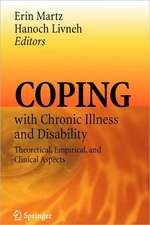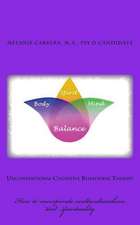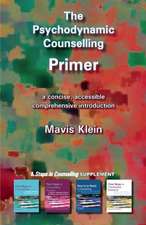Motivational Interviewing in the Treatment of Psychological Problems, Second Edition: Applications of Motivational Interviewing
Editat de Hal Arkowitz, Henry A. Westra, William R. Miller, Stephen Rollnicken Limba Engleză Paperback – 16 feb 2017
This authoritative guide, now significantly revised and expanded, has given tens of thousands of clinicians proven tools for helping clients resolve ambivalence and mobilize their energy, commitment, and personal resources for change. Leading experts describe ways to combine motivational interviewing (MI) with other treatments for a wide range of psychological problems, including depression, anxiety disorders, eating disorders, posttraumatic stress disorder, and others. Chapters illustrate the nuts and bolts of intervention, using vivid clinical examples, and review the empirical evidence base. Contributors show how to tailor MI to each population's needs, whether used as a pretreatment or throughout the course of therapy.
This book is in the Applications of Motivational Interviewing series, edited by Stephen Rollnick, William R. Miller, and Theresa B. Moyers.
New to This Edition
*Many new authors.
*Extensively revised with the latest theory, practices, and research.
*Chapters on domestic violence, addictions, and smoking cessation with adolescents.
*Chapter on transdiagnostic treatment.
This book is in the Applications of Motivational Interviewing series, edited by Stephen Rollnick, William R. Miller, and Theresa B. Moyers.
New to This Edition
*Many new authors.
*Extensively revised with the latest theory, practices, and research.
*Chapters on domestic violence, addictions, and smoking cessation with adolescents.
*Chapter on transdiagnostic treatment.
Preț: 261.31 lei
Preț vechi: 275.07 lei
-5% Nou
Puncte Express: 392
Preț estimativ în valută:
50.01€ • 52.02$ • 41.91£
50.01€ • 52.02$ • 41.91£
Carte disponibilă
Livrare economică 20 februarie-06 martie
Livrare express 06-12 februarie pentru 36.17 lei
Preluare comenzi: 021 569.72.76
Specificații
ISBN-13: 9781462530120
ISBN-10: 1462530125
Pagini: 400
Dimensiuni: 152 x 229 x 24 mm
Greutate: 0.58 kg
Ediția:2
Editura: Guilford Publications
Colecția Guilford Press
Seria Applications of Motivational Interviewing
ISBN-10: 1462530125
Pagini: 400
Dimensiuni: 152 x 229 x 24 mm
Greutate: 0.58 kg
Ediția:2
Editura: Guilford Publications
Colecția Guilford Press
Seria Applications of Motivational Interviewing
Public țintă
Professional Practice & DevelopmentCuprins
1. Learning, Applying, and Extending Motivational Interviewing, William R. Miller & Hal Arkowitz
2. Motivation Facilitation in the Unified Protocol for Transdiagnostic Treatment of Emotional Disorders, James F. Boswell, Kate H. Bentley, & David H. Barlow
3. Enhancing the Effectiveness of Exposure and Response Prevention in the Treatment of Obsessive–Compulsive Disorder: Exploring a Role for Motivational Interviewing, Allan Zuckoff, Iván C. Balán, & Helen Blair Simpson
4. Integrating Motivational Interviewing into the Treatment of Anxiety, Henny A. Westra & Adi Aviram
5. Enhancing Motivation in Individuals with Posttraumatic Stress Disorder and Comorbid Substance Use Disorders, David Yusko, Michelle L. Drapkin, & Rebecca Yeh
6. Motivational Interviewing as a Prelude to Psychotherapy for Depressed Women, Allan Zuckoff, Holly A. Swartz, & Nancy K. Grote
7. Motivational Interviewing and the Treatment of Depression, Sylvie Naar & Heather Flynn
8. Motivational Interviewing to Address Suicidal Ideation, Peter C. Britton
9. Motivational Pharmacotherapy: Combining Motivational Interviewing and Antidepressant Therapy to Improve Treatment Outcomes, Iván C. Balán, Theresa B. Moyers, & Roberto Lewis-Fernández
10. Motivational Interviewing in Treating Addictions, William R. Miller
11. Brief Treatments for Gambling Problems Using Motivational Approaches, David C. Hodgins, Jennifer L. Swan, & Katherine M. Diskin
12. Motivational Interviewing for Smoking Cessation with Adolescents, Suzanne M. Colby
13. Motivational Interviewing for Intimate Partner Violence, Erica M. Woodin
14. Motivational Interviewing in the Treatment of Disordered Eating, Stephanie C. Cassin & Josie Geller
15.Conclusions and Future Directions, Hal Arkowitz, William R. Miller, & Stephen Rollnick
Index
2. Motivation Facilitation in the Unified Protocol for Transdiagnostic Treatment of Emotional Disorders, James F. Boswell, Kate H. Bentley, & David H. Barlow
3. Enhancing the Effectiveness of Exposure and Response Prevention in the Treatment of Obsessive–Compulsive Disorder: Exploring a Role for Motivational Interviewing, Allan Zuckoff, Iván C. Balán, & Helen Blair Simpson
4. Integrating Motivational Interviewing into the Treatment of Anxiety, Henny A. Westra & Adi Aviram
5. Enhancing Motivation in Individuals with Posttraumatic Stress Disorder and Comorbid Substance Use Disorders, David Yusko, Michelle L. Drapkin, & Rebecca Yeh
6. Motivational Interviewing as a Prelude to Psychotherapy for Depressed Women, Allan Zuckoff, Holly A. Swartz, & Nancy K. Grote
7. Motivational Interviewing and the Treatment of Depression, Sylvie Naar & Heather Flynn
8. Motivational Interviewing to Address Suicidal Ideation, Peter C. Britton
9. Motivational Pharmacotherapy: Combining Motivational Interviewing and Antidepressant Therapy to Improve Treatment Outcomes, Iván C. Balán, Theresa B. Moyers, & Roberto Lewis-Fernández
10. Motivational Interviewing in Treating Addictions, William R. Miller
11. Brief Treatments for Gambling Problems Using Motivational Approaches, David C. Hodgins, Jennifer L. Swan, & Katherine M. Diskin
12. Motivational Interviewing for Smoking Cessation with Adolescents, Suzanne M. Colby
13. Motivational Interviewing for Intimate Partner Violence, Erica M. Woodin
14. Motivational Interviewing in the Treatment of Disordered Eating, Stephanie C. Cassin & Josie Geller
15.Conclusions and Future Directions, Hal Arkowitz, William R. Miller, & Stephen Rollnick
Index
Notă biografică
Hal Arkowitz, PhD, until his death in 2019, was Emeritus Associate Professor of Psychology at the University of Arizona. His life work was dedicated to understanding how people change and why they don’t. Dr. Arkowitz has published widely in the areas of psychotherapy and motivational interviewing. A scientist-practitioner for his entire career, he was deeply interested in how science can inform practice and how practice can inform science.
William R. Miller, PhD, is Emeritus Distinguished Professor of Psychology and Psychiatry at the University of New Mexico. He introduced motivational interviewing in a 1983 article and in the first edition of Motivational Interviewing(1991), coauthored with Stephen Rollnick. Dr. Miller’s research has focused particularly on the treatment and prevention of addictions and more broadly on the psychology of change. He is a recipient of two career achievement awards from the American Psychological Association, the international Jellinek Memorial Award, and an Innovators Award from the Robert Wood Johnson Foundation, among many other honors. His publications include 65 books and over 400 articles and chapters. His website is https://williamrmiller.net.
Stephen Rollnick, PhD, is Honorary Distinguished Professor in the School of Medicine at Cardiff University, Wales, United Kingdom. He is cofounder of motivational interviewing, with a career in clinical psychology and academia that focused on how to improve conversations about change, and helped to create the Motivational Interviewing Network of Trainers (https://motivationalinterviewing.org). He has worked in diverse fields, with special interests in mental health and long-term health conditions such as diabetes, heart disease, and HIV/AIDS. Dr. Rollnick has published widely in scientific journals and has written many books on helping people to change behavior. He is coauthor (with William R. Miller) of four editions of the classic work Motivational Interviewing. He has traveled worldwide to train practitioners in many settings and cultures, and he now works as a trainer and consultant in health care and sports. His website is www.stephenrollnick.com.
William R. Miller, PhD, is Emeritus Distinguished Professor of Psychology and Psychiatry at the University of New Mexico. He introduced motivational interviewing in a 1983 article and in the first edition of Motivational Interviewing(1991), coauthored with Stephen Rollnick. Dr. Miller’s research has focused particularly on the treatment and prevention of addictions and more broadly on the psychology of change. He is a recipient of two career achievement awards from the American Psychological Association, the international Jellinek Memorial Award, and an Innovators Award from the Robert Wood Johnson Foundation, among many other honors. His publications include 65 books and over 400 articles and chapters. His website is https://williamrmiller.net.
Stephen Rollnick, PhD, is Honorary Distinguished Professor in the School of Medicine at Cardiff University, Wales, United Kingdom. He is cofounder of motivational interviewing, with a career in clinical psychology and academia that focused on how to improve conversations about change, and helped to create the Motivational Interviewing Network of Trainers (https://motivationalinterviewing.org). He has worked in diverse fields, with special interests in mental health and long-term health conditions such as diabetes, heart disease, and HIV/AIDS. Dr. Rollnick has published widely in scientific journals and has written many books on helping people to change behavior. He is coauthor (with William R. Miller) of four editions of the classic work Motivational Interviewing. He has traveled worldwide to train practitioners in many settings and cultures, and he now works as a trainer and consultant in health care and sports. His website is www.stephenrollnick.com.
Recenzii
"Simply the best current and comprehensive work in this area. I truly enjoyed reading--and learned from--this volume. Key contributors cover conceptual bases, research, and application issues with equal assurance. This book should be on the shelf of every clinician interested in MI, as well as graduate students and trainees."--Keith S. Dobson, PhD, Department of Psychology, University of Calgary, Canada
"The second edition reflects contemporary advances in the practice of MI, as well as the solid science supporting its efficacy across a wide range of clinical problems. The contributors are outstanding practitioner-researchers. This is an excellent text for graduate courses aimed at conveying skills in research-supported psychotherapies, as is increasingly being mandated by professional guidelines. I highly recommend this book for graduate students and established practitioners alike."--Bruce A. Thyer, PhD, LCSW, BCBA-D, College of Social Work, Florida State University
"Reading this second edition has enhanced my motivation to learn more and teach more about this important, effective, and pragmatic approach. I will never again be 'stuck' in a psychotherapy impasse without thinking about using MI principles. The editors and contributors emphasize both the spirit and the technique of MI and apply it to treatment of specific symptoms and disorders. The book is of great value to novice and seasoned practitioners alike, and is an outstanding classroom text."--Richard F. Summers, MD, Department of Psychiatry, Perelman School of Medicine, University of Pennsylvania
"This beautifully written book is full of wisdom about helping people change. With engrossing clinical illustrations and great practical tips, it will be a first-line resource for clinicians who want to build their skills in MI."--Jesse H. Wright, MD, PhD, Professor and Kolb Endowed Chair of Outpatient Psychiatry and Director, Depression Center, University of Louisville
"I have had the pleasure of using this book for many years as a supplemental text in advanced graduate courses on psychotherapy, psychopathology, and MI. The text addresses one of the most important challenges for MI--the application of MI skills and strategies to the more complex problems in living. The editors and contributors are the top tier of MI trainers and researchers, and take on this challenge with great elegance and competence. This second edition is the perfect companion to Miller and Rollnick's Motivational Interviewing, Third Edition, and fills a very important niche in the MI library."--Gary S. Rose, PhD, Associate Professor, Department of Clinical Psychology, William James College; Adjunct Professor, Department of Community Health, Brown University School of Public Health
-Not only is MI here to stay, but, in fact, the application of MI has great potential as a treatment modality for helping with many diverse issues....Has something for everyone interested in psychological problems. It is appropriate for new clinicians, seasoned clinicians not familiar with MI, and even--or maybe especially--for those of us who are experienced motivational interviewers and MI trainers. (on the first edition)--PsycCRITIQUES, 1/23/2015ƒƒThe book guides readers on how to incorporate motivational interviewing techniques in their clinical practice, summarizes current research on the wide-ranging application of motivational interviewing, and highlights new and promising directions....The editors and authors have offered a volume that is likely to do what they do best: motivate the field to examine important questions in the service of helping clients for change. (on the first edition)--American Journal of Psychiatry, 1/23/2015ƒƒA practical guide, edited by the leading experts and developers of this technique....An excellent step-by-step guide to motivational interviewing rich in clinical vignettes and therapist-patient dialogues illustrating how to manage various clinical scenarios with skill and sensitivity...Therapists and researchers who are seeking a positive, respectful, and collaborative approach for helping diverse patients make positive change and for improving psychological interventions--this book is for you. (on the first edition)--Psychiatric Services, 1/23/2015ƒƒThis is an excellent book edited by the movers and shakers in the field of MI that addresses important clinical conditions and problems. The clinical vignettes are extremely helpful in demonstrating how the method is applied.--Doody's Review Service, 10/30/2015"The second edition reflects contemporary advances in the practice of MI, as well as the solid science supporting its efficacy across a wide range of clinical problems. The contributors are outstanding practitioner-researchers. This is an excellent text for graduate courses aimed at conveying skills in research-supported psychotherapies, as is increasingly being mandated by professional guidelines. I highly recommend this book for graduate students and established practitioners alike."--Bruce A. Thyer, PhD, LCSW, BCBA-D, College of Social Work, Florida State University
"Reading this second edition has enhanced my motivation to learn more and teach more about this important, effective, and pragmatic approach. I will never again be 'stuck' in a psychotherapy impasse without thinking about using MI principles. The editors and contributors emphasize both the spirit and the technique of MI and apply it to treatment of specific symptoms and disorders. The book is of great value to novice and seasoned practitioners alike, and is an outstanding classroom text."--Richard F. Summers, MD, Department of Psychiatry, Perelman School of Medicine, University of Pennsylvania
"This beautifully written book is full of wisdom about helping people change. With engrossing clinical illustrations and great practical tips, it will be a first-line resource for clinicians who want to build their skills in MI."--Jesse H. Wright, MD, PhD, Professor and Kolb Endowed Chair of Outpatient Psychiatry and Director, Depression Center, University of Louisville
"I have had the pleasure of using this book for many years as a supplemental text in advanced graduate courses on psychotherapy, psychopathology, and MI. The text addresses one of the most important challenges for MI--the application of MI skills and strategies to the more complex problems in living. The editors and contributors are the top tier of MI trainers and researchers, and take on this challenge with great elegance and competence. This second edition is the perfect companion to Miller and Rollnick's Motivational Interviewing, Third Edition, and fills a very important niche in the MI library."--Gary S. Rose, PhD, Associate Professor, Department of Clinical Psychology, William James College; Adjunct Professor, Department of Community Health, Brown University School of Public Health
Descriere
This authoritative guide, now significantly revised and expanded, has given tens of thousands of clinicians proven tools for helping clients resolve ambivalence and mobilize their energy, commitment, and personal resources for change. Leading experts describe ways to combine motivational interviewing (MI) with other treatments for a wide range of psychological problems, including depression, anxiety disorders, eating disorders, posttraumatic stress disorder, and others.





























